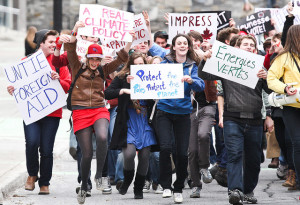The case for lowering the voting age is less persuasive now than at any point in the last 50 years
The debate on lowering the voting age has intensified in recent months, including in Parliament, as Democratic Audit posts this week by MPs Sarah Champion and Mark Harper have shown. In this post, Andrew Russell examines one of the arguments made by campaigners, that the voting age should be lowered to bring it in line with other rights 16 year olds enjoy, and finds that the evidence in support is far less clear cut than some proponents assume.

Should you be able to get married before you are allowed to vote in elections? Credit JW Marriott Guanacaste, CC BY 2.0
Craig Berry’s post on Democratic Audit arguing for the lowering of the minimum age of voting was interesting, and his call for a referendum on the subject seems irresistible since it would bring the entire topic of youth engagement with politics into the mainstream and ensure an informed and reasoned debate.
A curious feature of the current debate, exemplified in a recent article by former Labour minister Lord Adonis, is that proponents of lowering the voting age tend to essentialises the age of 16 as some accepted landmark of adulthood at the very time when evidence suggests that if it ever was such a landmark it longer can be considered the case. Law changes around childhood protection and social change mean the case for reducing the minimum age of voting in the UK is less persuasive now that at any point in the last half century.
Independent lives?
Lord Adonis asserted that:
“Given that 16 year olds are judged old enough to leave home, to marry, to lead an independent life, and even join the Army, it is hard to argue in the modern age that they shouldn’t also have the vote.”
This familiar argument holds little water. The rights that young people can accrue at 16 are minimal, irrelevant and diminishing.
Sex: the age of consent is now 16 for all forms of consensual sex in the UK (provided that it does not involve a person in a “position of trust” over a 16-19 year old). I fail to see the connection between lifestyle matters and voting rights, nevertheless the sexual age of consent is perhaps the only example of the age-restrictions in UK law being relaxed in recent years. In almost every other regard the movement has been in the other direction.
Leaving Home: the law allows for 16 year old to leave home but not in a way that allows them to be considered independent. Empirically, very few 16-17 year olds do leave home – in fact 90% still lived in parental homes in 2012 according to the ONS.
Furthermore only someone aged 18 or over can legally sign a tenancy agreement and local authorities must legally provide shelter for those under 18s presenting as homeless after the Law Lords judgement (G. vs Southwark 2009). A cynic might wonder whether such protective rights for vulnerable people under 18 can really be sustained once they are afforded the trappings of full citizenship such as voting rights.
Education: In the 1980s 16-17 year olds chose to stay in education in unprecedented numbers while the drive to expand access to Higher Education, and the economic crash of 2008 exacerbated this tendency. In fact according to the official figures, 92% of 16-17 year-olds now stay on.
The new English law raising the participation age means that young people have to stay in education or training tied to formal educational qualifications until aged 18 from 2015.
Taxation: The ‘no taxation without representation’ mantra is often used to support votes at 16. Our research for the Electoral Commission found that in 2001 thanks to relatively high tax thresholds and poor youth wages, only around 9% of 16-17 year olds actually earned enough to qualify to pay income tax, raising the participation age (education-leaving age) will reduce the proportion of economically-active and tax-paying 16 and 17 year olds further. And of course the Boston Tea Party was organized in protest against the type of indirect taxation that all consumers from 8-80 are subject to.
Marriage: Those under 18 need parental permission to marry in England, Wales and Northern Ireland (although not in Scotland). Under 18s can enlist in the UK armed forces – but again need parental permission to do so. Arguing that rights that require ‘parental permission’ justify extending the franchise seems rather bizarre.
Moreover the practice of young marriage is thankfully now the preserve of the super-religious only. The proportion of 16-17 year olds marrying in the UK has fallen dramatically in the past five decades. ONS statistics show that while in 1959 184 boys and 3,973 girls had married at the age of 16, by 2009 only 18 boys and 88 girls married at 16.
The Armed Forces: The UK’s signature on the Protocol of the UN Convention of the Human Rights of the Child means that 16-17 year olds are kept out of active service. The argument that young people can fight and die for their country before they can vote in the UK is untrue. Recruitment at 16 (with parental permission) continues – with an obligation to serve until age 22 – but this seems a very good argument for raising the age at which people can enlist rather than one for reducing the voting age.
Child Protection: Just like the protection for homeless young people mentioned above, there are countless examples of law changes being made in recent years to protect vulnerable children and young people. In every case the protective rights run to the age of 18. It is precisely because these young people are not yet recognized as full citizens that this protection has been afforded. Enfranchising 16 and 17 year olds might imperil these hard-earned rights. In recent years the UK has legislated so that the age at which one can legally buy tobacco, fireworks, have a tattoo, or visit a tanning booth has been raised to 18. These increased age thresholds, explicitly recognizing the need to protect young people make it hard to argue that 18 is not the recognized age of adulthood.
Turnout and Engagement
I do not accept the routinised arguments that asking 16 year olds to wait two years before being allowed to vote is the equivalent to historical obstacles to working class and female suffrage.
Neither do I care for the birthday lottery argument another familiar argument (infrequent General Elections mean some electors will have to wait until far too long to vote) which seems to disregard the ability to vote in national elections in Scotland, Wales and Northern Ireland, for elected Mayors, the Greater London Authority, the European Parliament, local councils, Police and Crime Commissioners (not to mention by-elections).
It seems to me that the effect on turnout is probably the weakest of all arguments in favour of changing or keeping the current voting entitlements. Nevertheless turnout issues do need looking at with more care than simply asserting that changing the law will improve youth engagement.
Although it’s frequently said that lowering the voting age in Austria has improved turnout in the youngest sections of society the evidence is mixed at best. Even in a research paper that supports the law change, Wagner et al. (2009) found that the average intention of turning out for 2009 European Parliament elections was lower for under 18s (59.1%) than for any other part of the electorate (62.4 for 18-24s and 73.8% for those over 30).
Elsewhere the story is even less convincing. As Jo Saglie states there is no evidence of increased political interest and engagement among 16 and 17 year olds in Norway when a lower voting age was trialled in local elections. Nearer to home the reduction of the voting age in the Isle of Man was disastrous. A hastily introduced reform with an apparently compromised public awareness campaign saw only just over one-third of eligible 16-17 year olds registered to vote in the Tynwald elections of 2006, and barely one-half of those actually voted.
Finally, some contemporary campaigners for votes at 16 have rather let the cat out of the bag by arguing that such a move would increase the chances of young people voting since in Sarah Birch’s words “more of them live with their parents and attend school”. So while some proponents argue 16 year olds should be enfranchised not because they are independent, others argue they should be enfranchised because they are not!
I think that you need a very good reason to make a fundamental change to voting rights – particular one like changing the age of majority which would be virtually impossible to undo once introduced. The so-called independence of 16 year olds simply isn’t good enough.
—
This post contains sections of a previous post from Policy@Manchester. It is part of a series on youth participation based on the Political Studies Association project, Beyond the Youth Citizenship Commission. For further details, please contact Dr Andy Mycock. An electronic copy of the Beyond the Youth Citizenship Commission: Young People and Politics volume can be downloaded here.
Note: This post represents the views of the author and does not give the position of Democratic Audit or LSE. Please read our comments policy before responding. Shortlink for this post: buff.ly/1jGyYJa
—
 Andrew Russell is Head of Department and Professor of Politics at the University of Manchester. He has written extensively on political engagement of young people and hard to reach groups and was a member of the Electoral Commission’s Project Board into the Age of Electoral Majority in 2004. He was part of the Commonwealth Election Observer Group in Mozambique in 2009. He tweets as @PoliBlogManc.
Andrew Russell is Head of Department and Professor of Politics at the University of Manchester. He has written extensively on political engagement of young people and hard to reach groups and was a member of the Electoral Commission’s Project Board into the Age of Electoral Majority in 2004. He was part of the Commonwealth Election Observer Group in Mozambique in 2009. He tweets as @PoliBlogManc.






 Democratic Audit's core funding is provided by the Joseph Rowntree Charitable Trust. Additional funding is provided by the London School of Economics.
Democratic Audit's core funding is provided by the Joseph Rowntree Charitable Trust. Additional funding is provided by the London School of Economics.
Good stuff from @PoliBlogManc via @democraticaudit on why lowering voting age tmight not be all it’s cracked up to be.https://t.co/CEz3aqaweB
case for @votesat16 less persuasive then ever argues @PoliBlogManc https://t.co/zLf9U8ne8L @ChloeSmithMP @Mark_J_Harper
case for @votesat16 less persuasive then ever argues @PoliBlogManc https://t.co/zLf9U8ne8L @HansardSociety @bycLIVE @citizenship
case for @votesat16 less persuasive then ever argues @PoliBlogManc https://t.co/zLf9U8ne8L @JonTonge @philipjcowley @PolStudiesAssoc
The case for lowering the voting age is less persuasive now than at any point in the last 50 years https://t.co/ebpG9RZWKh @PoliBlogManc
“Case for lowering the voting age is less persuasive now than at any point https://t.co/YtAjyAD0hB” Clearly @PoliBlogManc is not persuaded
The case for lowering the voting age is less persuasive now than at any point in the last 50 years https://t.co/OMJ9nj0gev
Case for cutting voting age less persuasive now than in last 50 years https://t.co/bcEuNghWdg Another senior pol scientist in Cowley mode
My contribution to Beyond the YCC debate https://t.co/yO0GrWxoq5